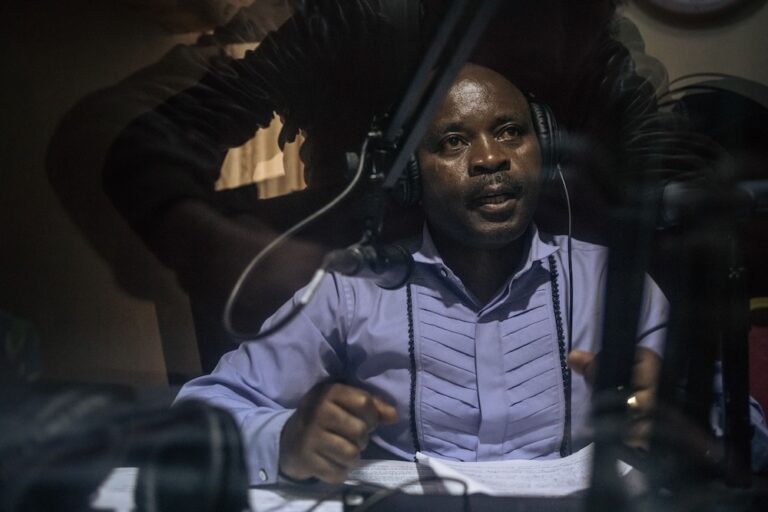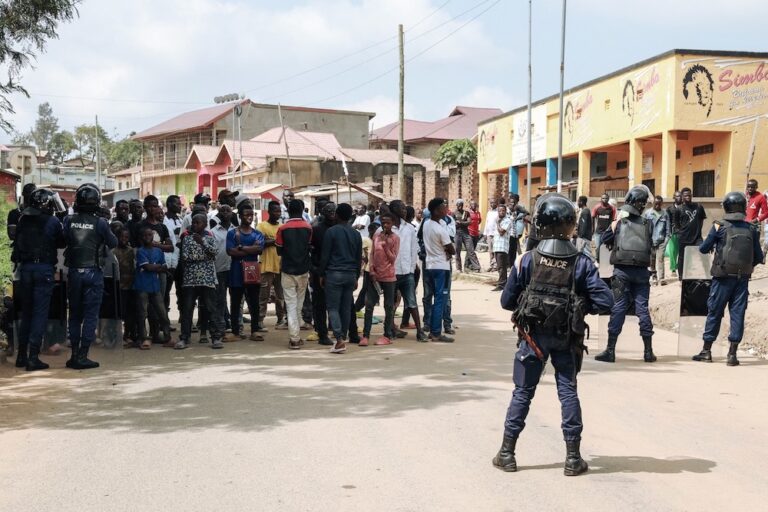(JED/IFEX) – The following is a 7 April 2003 JED press release: Kinshasa, 7 April 2003 JED welcomes the introduction of a new constitution, urges President Kabila and RCD/Goma to respect press freedom On Friday 4 April 2003, President Joseph Kabila signed into law the new constitution that the Congolese political class’s various factions agreed […]
(JED/IFEX) – The following is a 7 April 2003 JED press release:
Kinshasa, 7 April 2003
JED welcomes the introduction of a new constitution, urges President Kabila and RCD/Goma to respect press freedom
On Friday 4 April 2003, President Joseph Kabila signed into law the new constitution that the Congolese political class’s various factions agreed to following the long and difficult negotiating process in South Africa. In accordance with the new political order, Joseph Kabila took the oath of office as head of state before the Supreme Court on 7 April 2003.
Journaliste en danger (JED), a non-governmental organisation dedicated to the defence and promotion of press freedom, welcomes these developments and urges President Joseph Kabila and officials of the former rebel group RCD/Goma to respect the provisions of the new consitution concerning press freedom.
Articles 27, 28 and 29 of the new constitution highlight the DRC’s commitment to respect freedom of opinion and expression, the right to inform and to be informed and the independence of state media.
JED recalls that the government has been detaining journalist Bamporiki Chamira, of the daily La Tempête des Tropiques, in Kinshasa since 14 February 2003. The journalist spent one month in solitary confinement, detained without charge, at the National Intelligence Agency (Agence nationale de renseignements, ANR), during which time he was also denied the opportunity to receive visitors. On 24 March, he was brought before the State Security Court, which transferred him to Kinshasa’s Penitentiary and Reeducation Centre (Centre pénitentiaire et de rééducation de Kinshasa, CPRK). According to Chamira, he is accused, among other things, of having published an article, with the assistance of a human rights organisation, that cost an ANR official his job.
JED also notes that the RTNC (Congolese National Radiotelevision, a public channel) is not yet “a public service, equitable access to which is guaranteed to all political and social groups.” Objectivity, impartiality and the pluralism of opinions in the treatment and broadcast of news reports still depend on the political discourse of the day.
With regard to private audio-visual media, the RTA (Radiotélévision Amazone, which airs in Mbuji-Mayi) was recently authorised to resume broadcasts of its programmes. However, the programme “Lubila lwa Mukrezaka” remains banned. The programme was banned after the station aired a controversial report on an incident that took place on 21 February in a mine run by the diamond mining firm Minière de Bakwanga (MIBA), in which several miners died.
In Tshikapa, local community radio stations are prevented from broadcasting programmes in dialects that are widely-spoken in the region.
In Bukavu, RCD/Goma officials banned Radio Maendeleo on 9 December 2002 and the station has been shut down ever since. Two station managers, Kizito Mushizi and Jean Omba Kamembele, were jailed for 48 hours. Radio Maendeleo had aired a programme in which local residents of Bukavu had criticised the RCD/Goma’s decision to introduce new vehicle licence plates in areas under its control.
RCD/Goma Security Service agents reportedly arrested Ben Kabamba, a journalist with Radio Maria, in Bukavu a few days ago. The reason for his arrest remains unclear at present.
JED asks President Kabila and RCD/Goma officials to:
– Release journalists Bamporiki Chamira of Kinshasa’s La Tempête des Tropiques and Ben Kabamba of Bukavu’s Radio Maria immediately and without conditions;
– Lift the bans on Radio Maendeleo in Bukavu and on the Mbuji-Mayi-based RTA’s “Lubila lwa Mukrezaka” programme;
– Lift the ban on Tshikapa community radio stations’ airing of programmes in local dialects;
– Set up a High Authority for Media and revise the statutes of the RTNC public station so that they meet the constitutional requirements of “objectivity, impartiality and the pluralism of opinions in the treatment and broadcast of news reports”.
Kinshasa, 7 April 2003
JED Executive Committee


